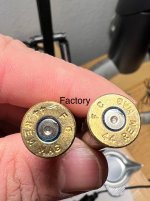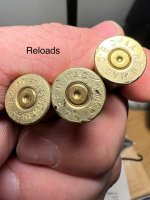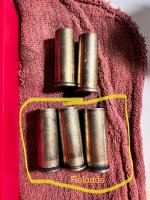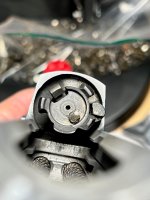H110 always produces a "heck of a fireball".
Soot on the cases can be from a "poor burn" or it can be from gas reaching the brass either before it seals to the chamber OR after it springs back during extraction. Generally speaking, a "poor burn" (incomplete combustion) will leave partially burnt or unburnt powder granules in the action. If this is not happening, your burn is adequate. It may not be optimal, but that's a different matter.
I noticed that the cases with the damaged rims are CBC brass the undamaged one is WW. It is possible the CBC stuff is a little "softer" and more easily dinged.
Your given load should put you in the 1300fps range. The gun cycled properly, didn't it?
The gas system in the Desert Eagle is fixed, and only one end of it is accessible for cleaning. It is IMPERATIVE that you only shoot jacketed bullets!!! NO LEAD EVER, no plated, or coated, either, and I would recommend that if you have any jacketed bullets with exposed lead in the base, you not use them in a DE, either.
In the DE, gas is ported from the barrel a bit ahead of the chamber, and travels in a tube under the bore to the front, where it enters the "gas cylinder part of the barrel assy, and pushes on the piston.
Lead, bullet lube (including coatings), along with powder gas can CLOG the gas system. Literally, plug it up. Powder residue alone normally doesn't. IF you clog the gas system it turns the semi auto into a manually operated repeater, and fixing it is NOT a warranty covered repair!
I know of one case where the owner "knew better" than the factory and shot lead slugs from his .44 DE. I don't remember exactly but I think he didn't get through two boxes before it clogged. Our local smith (who was a very good smith!) couldn't fix it. It got sent back to the maker. They couldn't (or didn't bother trying) fix it. The gun came back with a new barrel assy, and a bill, and the statement about how it was not a warranty covered repair.
The bill was $285 at a time when the new gun was $600!
I don't use H110, having lived through the era when there were 3 different recognized burn rates on the market, but that was long ago. My old books are not good guidelines for today's powder, one of the old books showing your load slightly below the starting load and two others showing it in about the middle of the range, @1300fps with heavier loads showing 1400fps.
You could load a few rounds a little heavier and see if that changes anything. DE's tend to like loads on the higher end of the range, for best function. I'd say also use a good hard crimp, H110 does better with a firm or heavy crimp.
Primers look ok, not really flattened, so all's well there. Consider going to a different powder if possible, 2400 works but is kind of dirty and not the best choice, WW 296 is nearly H110 but is very picky about being undloaded. I've used AA No.9 with good results in the DE.
Another point, I've had 4 DE's and every one is picky about feeding if there is any pressure on the magazine. Cup & Saucer hold can make them jam, the mag needs to "free float" for best results.
Be aware that not all autoloaders are reloader "brass friendly" My DE's have never beaten up my brass, but I might just be lucky in that regard.
Also be aware of the "trick" too light a load can pull in the DE. Too light a load can move the slide back far enough to cock the hammer, but not eject the empty, and feed it right back into the chamber. I discovered this decades ago firing a (one) .38 SPL in a .357 Mag DE. Round fired, slide cycled, gun was cocked (didn't notice the empty not coming out). Fired again, and "click"! Pulled the slide back and out came the fired case. Discontinued the idea of using .38s in DE's at that point.

I also recommend you keep a log of DE reloads, how many times you reload the brass. I never bothered and one time had a case head rip off during extraction, so now I only use new brass and after 3-4 reloads, use that brass for revolvers or single shots and get new stuff for the DE. Am probably a bit over cautious now, since I had to take my gun to a smith to the a case removed from the chamber...just something to be aware of...
Hope this helps...




